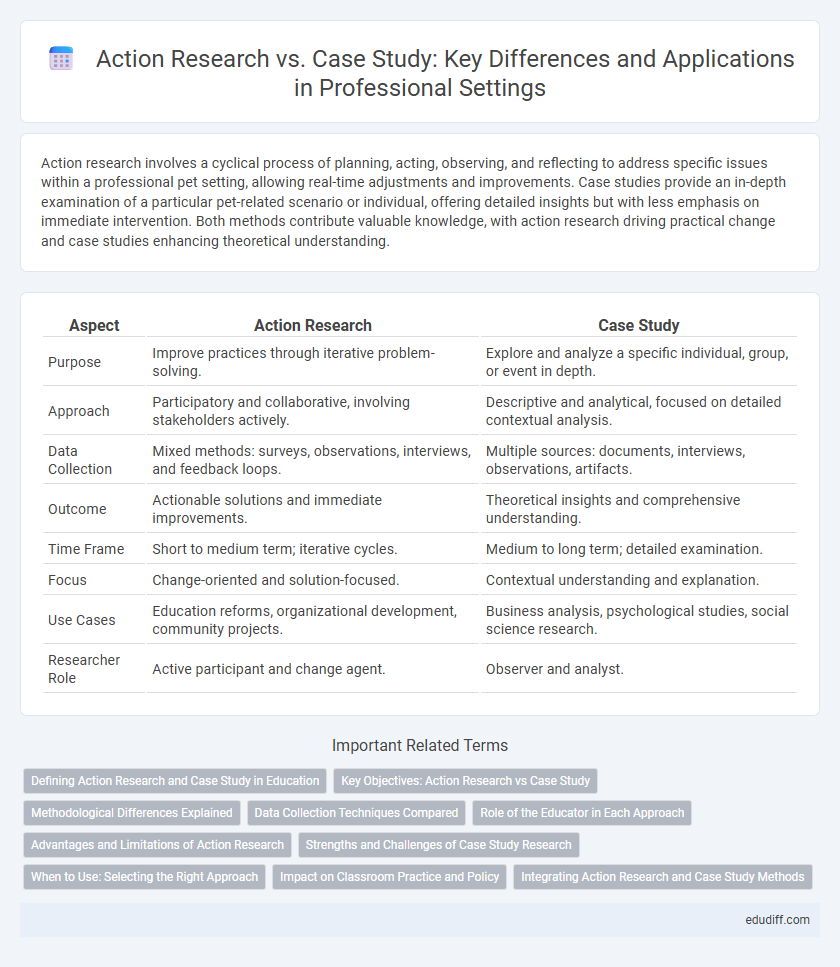Action research involves a cyclical process of planning, acting, observing, and reflecting to address specific issues within a professional pet setting, allowing real-time adjustments and improvements. Case studies provide an in-depth examination of a particular pet-related scenario or individual, offering detailed insights but with less emphasis on immediate intervention. Both methods contribute valuable knowledge, with action research driving practical change and case studies enhancing theoretical understanding.
Table of Comparison
| Aspect | Action Research | Case Study |
|---|---|---|
| Purpose | Improve practices through iterative problem-solving. | Explore and analyze a specific individual, group, or event in depth. |
| Approach | Participatory and collaborative, involving stakeholders actively. | Descriptive and analytical, focused on detailed contextual analysis. |
| Data Collection | Mixed methods: surveys, observations, interviews, and feedback loops. | Multiple sources: documents, interviews, observations, artifacts. |
| Outcome | Actionable solutions and immediate improvements. | Theoretical insights and comprehensive understanding. |
| Time Frame | Short to medium term; iterative cycles. | Medium to long term; detailed examination. |
| Focus | Change-oriented and solution-focused. | Contextual understanding and explanation. |
| Use Cases | Education reforms, organizational development, community projects. | Business analysis, psychological studies, social science research. |
| Researcher Role | Active participant and change agent. | Observer and analyst. |
Defining Action Research and Case Study in Education
Action research in education involves a systematic inquiry conducted by educators to improve teaching practices and student outcomes through iterative problem-solving cycles. Case studies in education are in-depth examinations of particular educational settings, programs, or individuals, providing detailed contextual analysis to understand complex phenomena. Both methodologies support evidence-based decision-making but differ in scope and purpose, with action research emphasizing practical intervention and case studies focusing on comprehensive description.
Key Objectives: Action Research vs Case Study
Action research aims to implement practical solutions through iterative cycles of planning, acting, observing, and reflecting to improve specific practices or solve problems within a real-world context. Case study focuses on an in-depth, contextual analysis of a single entity or phenomenon to understand its complexities and identify insights. The key objective of action research is transformative change, while case study seeks comprehensive understanding and detailed exploration.
Methodological Differences Explained
Action research involves iterative cycles of planning, acting, observing, and reflecting to solve practical problems within a real-world context, emphasizing active collaboration between researchers and participants. Case study methodology conducts an in-depth, contextual analysis of a specific individual, group, or organization, focusing on exploration and detailed description without necessarily involving intervention. Methodological differences lie in the purpose and process: action research aims for change and improvement through participatory action, whereas case studies seek comprehensive understanding through systematic documentation and analysis.
Data Collection Techniques Compared
Action Research employs iterative data collection methods such as participant observation, interviews, and reflective journals to facilitate continuous feedback and collaborative problem-solving. Case Study research relies on multiple sources of evidence, including document analysis, archival records, interviews, and direct observation, to develop a comprehensive understanding of a specific context. The key distinction lies in Action Research's dynamic, cyclical data collection aimed at immediate change, whereas Case Study emphasizes in-depth, systematic data gathering for detailed contextual analysis.
Role of the Educator in Each Approach
In action research, educators actively engage as both researchers and practitioners, systematically investigating their own teaching methods to improve student outcomes through iterative reflection and adaptation. In contrast, case study educators primarily function as observers or data collectors, analyzing specific educational contexts or individual cases to gain deeper insights without necessarily implementing immediate changes. The educator's role in action research is inherently participatory and transformative, while in case study research, it is more analytical and descriptive.
Advantages and Limitations of Action Research
Action Research offers direct engagement with real-world problems, enabling iterative problem-solving and immediate application of findings within professional settings. It facilitates collaboration between researchers and participants, promoting deeper understanding and practical improvements, though its subjective nature can limit generalizability and introduce researcher bias. The time-intensive process and reliance on active participant involvement may also challenge consistency and scalability across diverse contexts.
Strengths and Challenges of Case Study Research
Case study research excels in providing in-depth, contextual analysis of complex phenomena, allowing professionals to explore real-world issues within their natural settings. Its strength lies in capturing rich qualitative data and facilitating a holistic understanding of processes, behaviors, and outcomes across multiple variables. Challenges include potential biases in data collection, limited generalizability due to specific case focus, and the time-intensive nature of thorough case analysis.
When to Use: Selecting the Right Approach
Action research is ideal when practitioners aim to solve immediate problems and implement changes within their own organizations through iterative cycles of planning, acting, observing, and reflecting. Case studies are best suited for in-depth exploration of complex phenomena within real-life contexts, especially when understanding the nuances and unique aspects of a specific case is the primary goal. Choosing between the two depends on whether the focus is on practical problem-solving with active participation (action research) or comprehensive analysis of a single case for theoretical insights (case study).
Impact on Classroom Practice and Policy
Action research directly informs classroom practice by enabling educators to implement iterative changes based on real-time data, fostering immediate improvements in teaching strategies and student outcomes. Case studies provide in-depth analysis of specific educational settings or policies, offering comprehensive insights that can influence broader policy decisions and contribute to systemic reforms. Both methodologies complement each other by balancing practical classroom enhancements with strategic policy development grounded in detailed contextual understanding.
Integrating Action Research and Case Study Methods
Integrating action research and case study methods combines iterative problem-solving with in-depth contextual analysis, enhancing the depth and applicability of findings. Action research's cyclical approach allows for continuous reflection and adjustment, while case study methods provide rich, holistic insights into complex phenomena within real-life contexts. This synergy supports practical interventions grounded in thorough empirical evidence, benefiting professional practice and organizational decision-making.
Action Research vs Case Study Infographic

 edudiff.com
edudiff.com